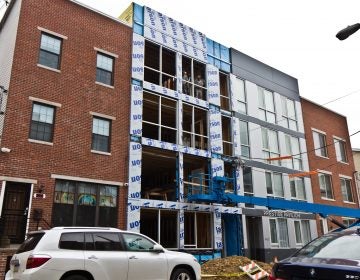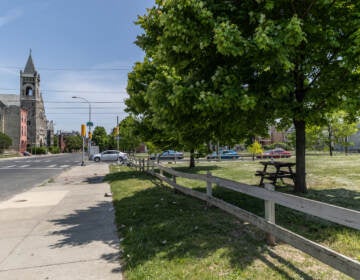Legislation to halt demolitions in NW Philly could bring court challenge
Councilmember Cindy Bass wants to put a six-month moratorium on most building demolitions in her district. The move may be unprecedented.

Two vacant homes were torn down to make way for new affordable housing. (WHYY/Zoe Read)
Legislation moving through Philadelphia City Council would temporarily ban most building demolitions in Philadelphia’s Eighth District.
If passed, the bill would put a sixth-month moratorium on taking down properties in several Northwest Philadelphia neighborhoods, including Chestnut Hill, Mt. Airy and Germantown, which is in the midst of significant change thanks to interest from a host of developers.
Demolitions for projects valued at or below $150,000 would be exempt under the legislation. Demolishing a property the city has deemed imminently dangerous would also be permitted.
Councilmember Cindy Bass, who introduced the measure, said the goal is to give her constituents time to “digest” the march of development in the district.
“Too often developers circumvent zoning requirements that make community input a prerequisite to development on existing structures. It’s a predatory practice that has had adverse effects on communities in my district and they’re doing it at a rate that threatens to outpace the community’s capacity to digest changes in their own neighborhood,” said Bass after introducing the bill last week.
A Council committee must approve the legislation before the full body votes on the measure, a possibly unprecedented example of what’s known as councilmanic prerogative. The long-standing practice effectively gives council members final say over development in their districts.
Gary Jonas, president of the Building Industry Association of Philadelphia, said he cannot recall another instance of a council member attempting to halt building demolitions in an entire legislative district, only on a particular street or on a set of blocks.
“This is kind of uncharted territory,” said Jonas.
He doesn’t mean that in a good way.
Jonas, who does development work in the district as principal of The HOW Group, said he and other BIA members will be dealt a financial blow if Council passes Bass’ measure. He said he also takes issue with the bill because it injects uncertainty into the development industry.
“What we want is consistency. So we know what we can do, we know what’s allowed. And when you see people just kind of being totally inconsistent with what the city’s laid out as their plan, it makes it difficult to do business,” said Jonas, adding that the BIA would back any member who might choose to challenge the legislation in court.
A 2001 ruling from the Supreme Court of Pennsylvania could be the basis for it. The jurists found that cities cannot ban construction or demolition, overturning a lower court decision.
A city spokesperson said the Law Department has not yet reviewed the legislation.
Bass could not be reached for comment.
This is not the first time Bass has stirred controversy when it comes to development. Last month, an ad-hoc group in Germantown filed a formal complaint against the three-term lawmaker, saying she abused her power during a December community meeting called to discuss the future of the Germantown YWCA building, a neighborhood landmark that’s sat vacant for close to two-decades.
Filed with the City Controller’s Office, the complaint asserts that Bass “hijacked” the meeting and “incited physically threatening behavior by unknown men who seemed to be there on Cindy’s behalf.”
The contentious meeting was precipitated by the Philadelphia Redevelopment Authority’s decision last year to cut ties with KBK Enterprises, the Pittsburgh-based company selected in 2016 to restore the Y. The unusual decision came after neighbors pressured the authority to change course because KBK had done little with property during the six years it was attached to the project.
It remains unclear when or if the PRA will issue a new request for proposals.
Bass would not directly address the complaint, but has insisted the city discriminated against KBK, a Black-owned company.
WHYY is your source for fact-based, in-depth journalism and information. As a nonprofit organization, we rely on financial support from readers like you. Please give today.









